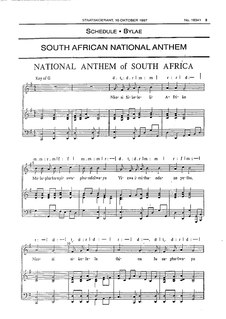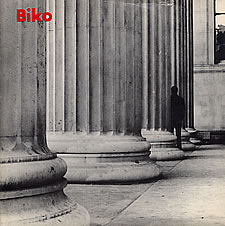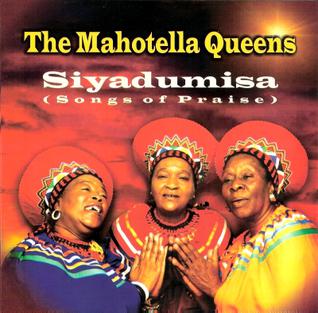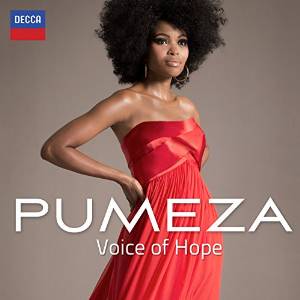
The National Anthem of South Africa was adopted in 1997 and is a hybrid song combining new English lyrics with extracts of the 19th century hymn "Nkosi Sikelel' iAfrika" and the Afrikaans song "Die Stem van Suid-Afrika", which was used as the South African national anthem during the apartheid era. The committee responsible for this new composition included Anna Bender, Elize Botha, Richard Cock, Dolf Havemann (Secretary), Mzilikazi Khumalo (Chairman), Masizi Kunene, John Lenake, Fatima Meer, Khabi Mngoma, Wally Serote, Johan de Villiers, and Jeanne Zaidel-Rudolph.

"Mungu ibariki Afrika" is the national anthem of Tanzania. It is a Swahili language version of Enoch Sontonga's popular hymn "Nkosi Sikelel' iAfrika".
"Stand and Sing of Zambia, Proud and Free" is the national anthem of Zambia. The tune is taken from the hymn "Nkosi Sikelel' iAfrika", which was composed by Xhosa composer Enoch Sontonga, in 1897. The lyrics were composed after Zambian independence to specifically reflect Zambia, as opposed to Sontonga's lyrics, which refer to Africa as a whole.

Die Stem van Suid-Afrika, also known as "The Call of South Africa" or simply "Die Stem", is a former national anthem of South Africa. There are two versions of the song, one in English and the other in Afrikaans, which were in use early on in the Union of South Africa alongside God Save the Queen and as the sole anthem after South Africa became a republic. It was the sole national anthem from 1957 to 1994, and shared co-national anthem status with "God Save the King/Queen" from 1938 to 1957. After the end of apartheid in the early 1990s, it was retained as a co-national anthem along with "Nkosi Sikelel' iAfrika" from 1994 to 1997, when a new hybrid song incorporating elements of both songs was adopted as the country's new national anthem, which is still in use.

"Nkosi Sikelel' iAfrika" is a Christian hymn originally composed in 1897 by Enoch Sontonga, a Xhosa clergyman at a Methodist mission school near Johannesburg.

Enoch Mankayi Sontonga was a South African composer, who is best known for writing the Xhosa song "Nkosi Sikelel' iAfrika", which, in abbreviated version, has been sung as the first half of the national anthem of South Africa since 1994. Previously, it had been the official anthem of the African National Congress since 1925. It was also adopted by South Africa's newly formed northern neighbour, Zimbabwe and translated into Shona, "Ishe Komborera Afrika" from 1980 until 1994...

The Mahotella Queens is a South African female band formed in 1964 by music producer Rupert Bopape, consisting of Hilda Tloubatla, Nobesuthu Mbadu, and Amanda Nkosi. The group is noted for their distinct vocal harmony sound, guitar-led mbaqanga music, and fast stage dancing.

"Biko" is an anti-apartheid protest song by English rock musician Peter Gabriel. It was released by Charisma Records as a single from Gabriel's eponymous third album in 1980.
Bright Blue was a South African band that was prominent on the progressive scene in the final years of apartheid. The band's name "reflected the paradox of being bright in a very blue time" but was also a tribute to Chelsea FC.

Dream Keeper is an album by bassist Charlie Haden that was recorded in 1990 and released by Blue Note Records. The album was nominated for a Grammy Award for Best Large Jazz Ensemble Performance and was voted "Jazz album of the year" in Down Beat magazine's 1991 critics' poll. Haden, Carla Bley and Ray Anderson also placed first in that year's Acoustic Bass, Composer and Trombone poll categories, respectively.
Kazet is a 2006 album by the South African mbaqanga group the Mahotella Queens. The album was a compilation of recordings that had recently been recorded in South Africa and in Paris, and included the South African national anthem "Nkosi Sikelel' iAfrika" in addition to new compositions such as "Amazemula" ("Monster"), "Nomshloshazana" and "Ubusuku Nemini" and classics like "Kazet".

Siyadumisa is a 2007 album by the South African mbaqanga group the Mahotella Queens. The album is the first gospel-orientated album by the Queens, and features the voice of lead singer Hilda Tloubatla's son, Alfred "Ali" Temo. The album was released in May 2007 in South Africa on the Bula Music label, and was a joint venture between Bula and AS Entertainment. It is as yet unknown when the album will receive its US and UK release.
The Bang is a South African indie pop band from Johannesburg, South Africa. The band presently consists of Joshua Gregg ; Gad de Combes ; Stefan Lawrence ; Barry Sherman
"Weeping" is an anti-apartheid protest song written by Dan Heymann in the mid-1980s, and first recorded by Heymann and the South African group Bright Blue in 1987. The song was a pointed response to the 1985 State of Emergency declared by President P.W. Botha, which resulted in "large-scale killings of unarmed and peaceful demonstrators against racial discrimination and segregation in South Africa." Defiantly, the song incorporated part of the melody to Nkosi Sikelel' iAfrika, the anthem of the anti-apartheid African National Congress. "Nkosi Sikelel' iAfrika" was banned at the time, and inclusion of even the melody violated the law. Today, "Nkosi Sikelel' iAfrika" is part of the national anthem of South Africa. The formerly illegal lyrics—"Nkosi sikelela, thina lusapho lwayo"—are now often sung when "Weeping" is recorded or performed.

Paradise in Gazankulu is an album by Harry Belafonte, released by EMI Records in 1988. As of 2020, it is Harry Belafonte's final studio album. The album deals with the plight of black South Africans under the Apartheid system. The album was re-released as an official mp3 download by amazon.com, and iTunes in the U.K. in 2010.

Since unification in 1910, South Africa has used a range of national symbols to identify the country: coats of arms, official seals, flags, national anthems, and floral, bird, animal, and other emblems.
"Aberystwyth" is a hymn tune composed by Joseph Parry, written in 1876 and first published in 1879 in Edward Stephen's Ail Lyfr Tonau ac Emynau. Parry was at the time the first professor and head of the new department of music at the recently founded University College Wales, Aberystwyth, now called Aberystwyth University.

Voice of Hope is a 2014 album by South African opera singer Pumeza Matshikiza. The album was released on Decca Records.
Nkosi is a Nguni word for “king”, “chief“ and ”lord”.












